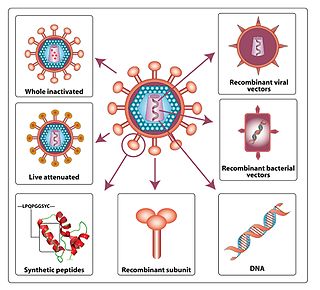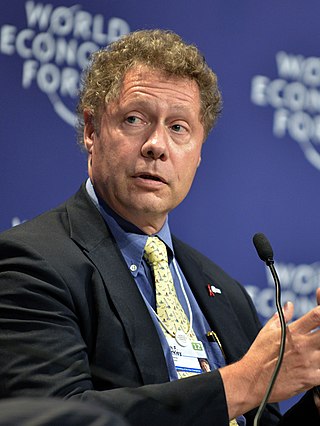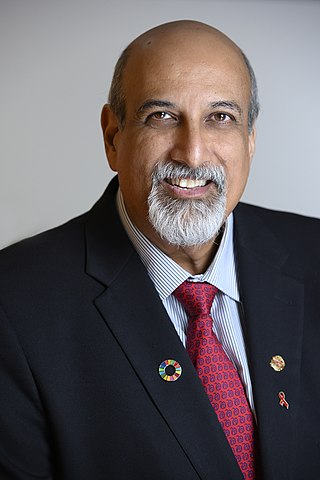
An HIV vaccine is a potential vaccine that could be either a preventive vaccine or a therapeutic vaccine, which means it would either protect individuals from being infected with HIV or treat HIV-infected individuals.

Tropical medicine is an interdisciplinary branch of medicine that deals with health issues that occur uniquely, are more widespread, or are more difficult to control in tropical and subtropical regions.
Since October 2018, the Center for Global Infectious Disease Research has been part of the Seattle Children's Research Institute. At the time of the merger, CID Research had 166 scientists. Its mission was to eliminate the world's most devastating infectious diseases through leadership in scientific discovery. The organization's research labs were in the South Lake Union area of Seattle, WA. The institute's research focused on four areas of infectious disease: HIV/AIDS, malaria, tuberculosis (TB), and Emerging & Neglected Diseases (END) like African sleeping sickness, leishmaniasis, Chagas disease, and toxoplasmosis. CID Research was engaged in early stages of the scientific pipeline including bench science and malaria clinical trials and has expertise in immunology, vaccinology, and drug discovery.
FHI 360 is a nonprofit human development organization based in North Carolina. FHI 360 operates in more than 70 countries and all U.S. states and territories. Established in 1971, the organization manages projects relating to family planning and reproductive health. In 1986 the organization began a worldwide response to HIV/AIDS. FHI 360's research and programs also address malaria, tuberculosis, and other infectious and chronic diseases and international agencies, governments, foundations, research institutions, and individual donors.

The Drugs for Neglected Diseases initiative (DNDi) is a collaborative, patients' needs-driven, non-profit drug research and development (R&D) organization that is developing new treatments for neglected diseases, notably leishmaniasis, sleeping sickness, Chagas disease, malaria, filarial diseases, mycetoma, paediatric HIV, cryptococcal meningitis, hepatitis C, and dengue. DNDi's malaria activities were transferred to Medicines for Malaria Venture (MMV) in 2015.

Chelsea and Westminster Hospital is a 430-bed teaching hospital located in Chelsea, London. The hospital has a rich history in that it serves as the new site for the Westminster Hospital. It is operated by Chelsea and Westminster Hospital NHS Foundation Trust, and became a member of Imperial College Academic Health Science Centre in July 2020. The hospital is the central part of Imperial College London Chelsea and Westminster Campus, and plays an integral role in teaching students and medical research at Imperial College London.

PATH is an international, nonprofit global health organization. PATH is based in Seattle with 1,600 employees in more than 70 countries around the world. Its president and CEO is Nikolaj Gilbert, who is also the Managing Director and CEO of Foundations for Appropriate Technologies in Health (FATH), PATH's Swiss subsidiary. PATH focuses on six platforms: vaccines, drugs, diagnostics, devices, system, and service innovations.

Seth Franklin Berkley is an American medical epidemiologist and a global advocate of the power of vaccines. He is the founder and former president and CEO of the International AIDS Vaccine Initiative (IAVI) and former CEO of Gavi, the Vaccine Alliance. He is currently a senior advisor to the Pandemic Center at Brown University School of Public Health.

JN-International Medical Corporation (JNIMC) is a U.S.-based biopharmaceutical corporation which since 1998 has been focused on developing vaccines and diagnostics for infectious disease for developing countries. This private corporation was founded in 1998 by Dr. Jeeri R. Reddy with the help of Dr. Kelly F. Lechtenberg in a small rural town, Oakland, Nebraska. From there it grew and expanded until in the year 2000 the corporation moved to Omaha, Nebraska.
Global Health Initiatives (GHIs) are humanitarian initiatives that raise and disburse additional funds for infectious diseases – such as AIDS, tuberculosis, and malaria – for immunizations and for strengthening health systems in developing countries. GHIs classify a type of global initiative, which is defined as an organized effort integrating the involvement of organizations, individuals, and stakeholders around the world to address a global issue.
Zeda Fran Rosenberg is an American microbiologist and epidemiologist, active in HIV biology and prevention. She is the chief executive officer of the International Partnership for Microbicides (IPM). IPM was founded by Rosenberg in 2002 and is a nonprofit organization dedicated to developing microbicides and other innovative HIV prevention products and making them available for women in developing countries.

Agnes Binagwaho is a Rwandan Politician, pediatrician, co-founder and the former vice chancellor of the University of Global Health Equity (2017-2022). In 1996, she returned to Rwanda where she provided clinical care in the public sector as well as held many positions including the position of Permanent Secretary for the Ministry of Health of Rwanda from October 2008 until May 2011 and Minister of Health from May 2011 until July 2016. She has been a professor of global health delivery practice since 2016 and a professor of pediatrics since 2017 at the University of Global Health Equity. She has served the health sector in various high-level government positions. She resides in Kigali.

CureVac N.V. is a German biopharmaceutical company. It develops therapies based on messenger RNA (mRNA). Headquartered in Tübingen, Germany, the company was founded in 2000 by Ingmar Hoerr (CEO), Steve Pascolo (CSO), Florian von der Mulbe (COO), Günther Jung, and Hans-Georg Rammensee. CureVac has approximately 375 employees since May 2018.

Salim S. Abdool Karim, MBChB, MMed, MS(Epi), FFPHM, FFPath (Virol), DipData, PhD, DSc(hc), FRS is a South African public health physician, epidemiologist and virologist who has played a leading role in the AIDS and COVID-19 pandemic. His scientific contributions have impacted the landscape of HIV prevention and treatment, saving thousands of lives.
Remune is the first therapeutic HIV vaccine based on the killed whole virus approach. Remune was initially invented by Jonas Salk in 1987 and is now being developed by Immune Response BioPharma, Inc. (IRBP)
Francine NtoumiPh.D., HDR, PvDz, FRCPedin is a Congolese parasitologist specializing in malaria. She was the first African person in charge of the secretariat of the Multilateral Initiative on Malaria (2006-2010). In recent years, she has become involved in research on other infectious diseases, including COVID-19.

Linda-Gail Bekker MBChB, DTMH, DCH, FCP(SA) is a Professor of Medicine and Chief Operating Officer of the Desmond Tutu HIV Foundation. She is also Director of the Desmund Tutu HIV Centre at the University of Cape Town. She is a Past President of the International AIDS Society (2016-18).
Gita Ramjee was a Ugandan-South African scientist and researcher in HIV prevention. In 2018, she was awarded the ‘Outstanding Female Scientist’ award from the European and Developing Countries Clinical Trials Partnership. She died in uMhlanga, South Africa, from COVID-19 related complications.
The European Vaccine Initiative (EVI) is a non-profit Product Development Partnership (PDP) with the goal of supporting and accelerating the development of effective and affordable vaccines for global health. Since its inception in 1998, EVI has operated as an independent non-profit organisation that works closely with academic researchers, the private sector, governments, and other organisations to spearhead vaccine development. Headquartered in Heidelberg, Germany, EVI collaborates with partners across the world to pursue its mission.
MTBVAC is a candidate vaccine against tuberculosis in humans currently in research trials. It is based on a genetically modified form of the Mycobacterium tuberculosis pathogen isolated from humans.











